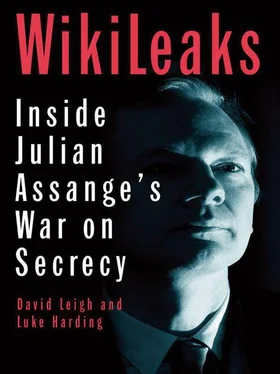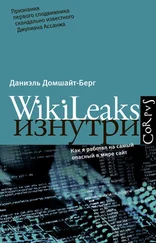Harding, Luke - WikiLeaks - Inside Julian Assange's War on Secrecy
Здесь есть возможность читать онлайн «Harding, Luke - WikiLeaks - Inside Julian Assange's War on Secrecy» весь текст электронной книги совершенно бесплатно (целиком полную версию без сокращений). В некоторых случаях можно слушать аудио, скачать через торрент в формате fb2 и присутствует краткое содержание. Жанр: Старинная литература, на английском языке. Описание произведения, (предисловие) а так же отзывы посетителей доступны на портале библиотеки ЛибКат.
- Название:WikiLeaks: Inside Julian Assange's War on Secrecy
- Автор:
- Жанр:
- Год:неизвестен
- ISBN:нет данных
- Рейтинг книги:3 / 5. Голосов: 1
-
Избранное:Добавить в избранное
- Отзывы:
-
Ваша оценка:
- 60
- 1
- 2
- 3
- 4
- 5
WikiLeaks: Inside Julian Assange's War on Secrecy: краткое содержание, описание и аннотация
Предлагаем к чтению аннотацию, описание, краткое содержание или предисловие (зависит от того, что написал сам автор книги «WikiLeaks: Inside Julian Assange's War on Secrecy»). Если вы не нашли необходимую информацию о книге — напишите в комментариях, мы постараемся отыскать её.
WikiLeaks: Inside Julian Assange's War on Secrecy — читать онлайн бесплатно полную книгу (весь текст) целиком
Ниже представлен текст книги, разбитый по страницам. Система сохранения места последней прочитанной страницы, позволяет с удобством читать онлайн бесплатно книгу «WikiLeaks: Inside Julian Assange's War on Secrecy», без необходимости каждый раз заново искать на чём Вы остановились. Поставьте закладку, и сможете в любой момент перейти на страницу, на которой закончили чтение.
Интервал:
Закладка:
But the logs reveal that the coalition has a formal policy of ignoring torture allegations. They record “no investigation is necessary” and simply pass reports to the same Iraqi units implicated in the violence. By contrast all allegations involving coalition forces are subject to formal inquiries.
Even when torture like this was not being alleged, vignette after vignette emerged from the Iraq logs of killings which must have been deeply degrading and damaging to their military perpetrators.
On 22 February 2007, for example, an Apache helicopter gunship crew – from the same unit that killed the Reuters employees, call sign Crazyhorse 18 – radioed back to base for advice about their aerial man-hunt. They were chasing down a pair of insurgents who had been lobbing mortar shells at a US base, and then attempted to make off in a van. Crazyhorse 18 shot up the van. The two men jumped out and tried to escape in a dumper truck. Crazyhorse 18 shot that up, too. “They came out wanting to surrender,” the helicopter crew signalled back to base, asking for advice. What were they to do? It is a sign of US respect for legal forms that the base lawyer was immediately on hand, ready to be consulted. The controller signalled back: “Lawyer states they cannot surrender to aircraft and are still valid targets.” So the helicopter crew killed the men, as they were attempting to surrender.
Those two dead men were enemy combatants. The same could probably not be said of a car which drove too close to a supply convoy outside Baghdad. The marines in the rear Humvee claimed afterwards that they had made hand signals and fired warning shots to the engine-block “to warn the vehicle to slow down and not approach the convoy”. When it had closed to within 20 yards of the Humvee, the marines started putting shots into its windscreen.
The spare uppercase prose of the leaked field report takes up the story.
THE VEHICLE SWERVED OFF THE ROAD INTO A CANAL 1.5KM NORTH OF SAQLAWIYAH (38S LB 768 976) AND SANK. (1) ADULT MALE EXITED THE VEHICLE AND WAS RECOVERED FROM THE CANAL; ALL OTHER PASSENGERS SANK WITH THE VEHICLE. THE ADULT MALE WAS TREATED BY THE CORPSMAN ON THE SCENE AND WAS TRANSPORTED TO THE SAQLAWIYAH JCC AND SUBSEQUENTLY TRANSPORTED TO THE JORDANIAN HOSPITAL. SAQLAWIYAH I[RAQI] P[OLICE] S[ERVICE] RESPONDED TO THE SCENE AND RECOVERED (2) ADULT FEMALES, (3) CHILDREN AGES 5 TO 8, AND (1) INFANT FROM THE VEHICLE. ALL (6) HAD DROWNED. THE SAQLAWIYAH IPS ARE TAKING ALL RECOVERED BODIES TO RAMADI.
These were not the hi-tech military heroics so frequently put out by the US army’s press releases, but acts of cruelty more worthy perhaps of a place in a modern version of Goya’s dark etchings from early 19th-century Spain, “The Disasters of War”.
Assange had launched the publication of the Iraq logs in the grandiose ballroom of the Park Plaza hotel on the Thames, with Iraq Body Count, Phil Shiner of Public Interest Lawyers, and a TV documentary team all in attendance. Shortly before 10am, the teams lined up in the corridor behind Assange, who was wearing a sharp suit and tie, and led them out into a blizzard of flashbulbs and camera lights. He was mobbed. It was as if the Australian were a rock star with his entourage. About 300 journalists had turned out to watch his performance, five times more than at the launch of the Afghan logs. When the packed room was called to order, Assange intoned: “This disclosure is about the truth.”
He had now delivered two of his controversial leaked “packages” to the newspapers, with striking results. But the question in the Guardian and New York Times journalists’ minds, as they watched the adulation, was would Assange be prepared to honour his undertaking, and hand over “package three” for publication? That might prove even more sensational.
CHAPTER 11
The cables
Near Lochnagar, Scotland
August 2010
“ ACollectionOfDiplomaticHistorySince_1966_ToThe_PresentDay# ”
ASSANGE’S 58-CHARACTER PASSWORD
David Leigh had listened patiently to Assange, who had instructed him that he must never allow his memory stick to be connected to any computer that was exposed to the internet, for fear of electronic eavesdropping by US intelligence. But there was currently no danger of that at all. Leigh’s rented cottage way up in the Scottish Highlands was unable even to receive a TV signal, never mind a broadband connection. The Guardian ’s investigations editor had originally planned to spend his annual summer vacation with his wife, hill-walking in the Grampians. But the summits of Dreish, Mayar, Lochnagar and Cat Law went unclimbed. He sat transfixed at his desk instead, while the sun rose and set daily on the heather-covered hills outside. On the tiny silver Hewlett Packard thumb-drive plugged into his MacBook were the full texts of more than 250,000 diplomatic cables. To search through them was maddening, tiring – and utterly compelling.
It had been a struggle to prise these documents out of Assange back in London. There were repeated pilgrimages to the mews house belonging to Vaughan Smith’s Frontline Club near Paddington station before Assange reluctantly turned them over. “We have to able to work on them, Julian,” Leigh had argued. “None of the partners have any real idea what’s there, except their contents are supposed to give Hillary Clinton a heart attack!” Assange was keeping the three news organisations dangling, despite his original agreement to deliver all the material for publication. He willingly passed on the less important war logs from Afghanistan and Iraq, but talked of how he would use his power to withhold the cables in order to “discipline” the mainstream media.
The atmosphere had become even more problematic since Nick Davies personally broke off relations in the summer, after Assange breached the original compact, as Davies saw it, by going behind his back to the Guardian ’s TV rivals at Channel 4, taking with him all the knowledge acquired by privileged visits to the Guardian ’s research room. Davies at the time said he felt betrayed: Assange simply insisted there had never been a deal.
The other Guardian journalists tightened their lips and held their peace. There was still a long road to travel if all the leaks were ever to come out. But after the publication of the Afghan war logs, Assange proposed to change the terms of the deal once again, before the planned launch of the much bigger tranche of Iraq logs. He wanted more television, in order to provide “emotional impact”. He had by now made some new friends in London – Ahmad Ibrahim, from the Qatari-funded Al Jazeera, and Gavin MacFadyen from City University in London. MacFadyen, a veteran of World in Action , one of Britain’s most distinguished investigative TV series in the 1970s, had recently helped set up an independent production company based at the university. Called the Bureau of Investigative Journalism, it was funded by the David and Elaine Potter Foundation. Elaine had been a reporter during the great days of London’s Sunday Times , and her husband David had made millions from the development of the Psion computer. There was a distinct prospect that the wealthy Potter Foundation might become patrons of WikiLeaks: the Florentine Medicis, as it were, to Assange’s Michelangelo. Rapidly, the “Bureau” was drawn into Assange’s new plans.
He demanded that print publication of the Iraq war logs be postponed for at least another six weeks. This would enable the Bureau, under Assange’s guidance, to sell a TV documentary to Channel 4’s well-regarded Dispatches series. The Bureau would also make and sell a second documentary, of a more wide-ranging nature, to be aired on both Al Jazeera’s Arabic and English-language channels, which could be guaranteed to cause uproar in the Middle East. Both documentaries eventually got made, and Assange sensibly hired a respected NGO, Iraq Body Count, to analyse the casualty figures for the TV productions.
Читать дальшеИнтервал:
Закладка:
Похожие книги на «WikiLeaks: Inside Julian Assange's War on Secrecy»
Представляем Вашему вниманию похожие книги на «WikiLeaks: Inside Julian Assange's War on Secrecy» списком для выбора. Мы отобрали схожую по названию и смыслу литературу в надежде предоставить читателям больше вариантов отыскать новые, интересные, ещё непрочитанные произведения.
Обсуждение, отзывы о книге «WikiLeaks: Inside Julian Assange's War on Secrecy» и просто собственные мнения читателей. Оставьте ваши комментарии, напишите, что Вы думаете о произведении, его смысле или главных героях. Укажите что конкретно понравилось, а что нет, и почему Вы так считаете.












